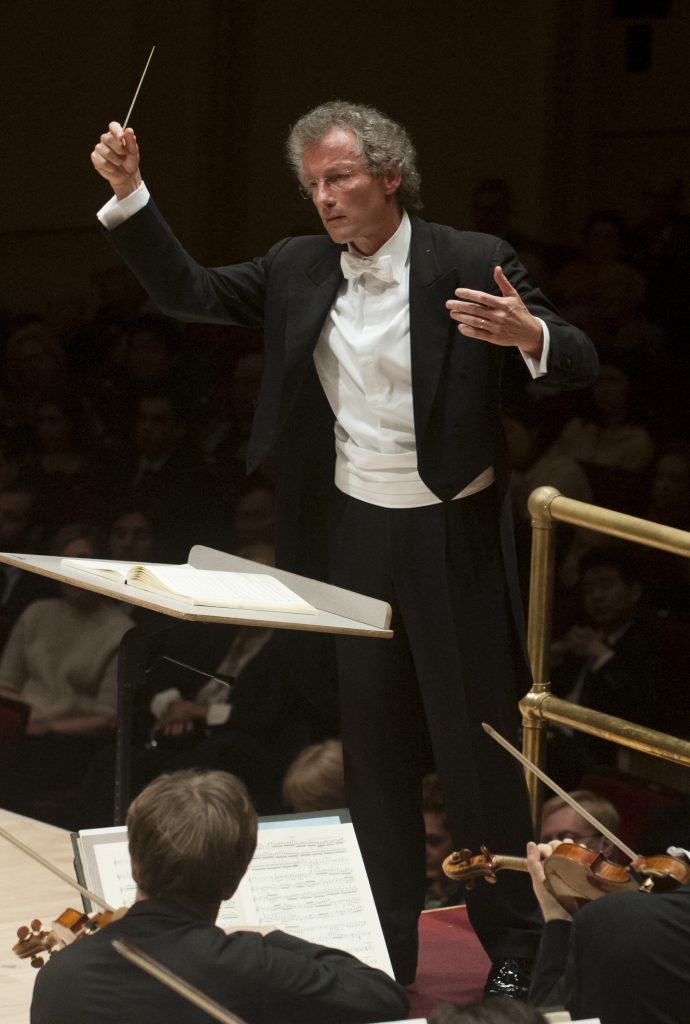Welser-Möst enlivens musical cliches with Vienna Philharmonic

Franz Welser-Möst conducted the Vienna Philharmonic Friday night at Carnegie Hall.
Music is essentially a set of clichés. Ideas are only new at their inception; once they propagate, they become formal and rhetorical gestures that have a pre-set stamp of meaning on them. This is not a bad thing, they are the building blocks of music after all, the ingredients in the cake. How they work depends on how well they’re used together.
The Vienna Philharmonic opened their annual concert run at Carnegie Hall Friday night with several sets of clichés. One was the program itself, which began with an overture, proceeded to the U.S. premiere of a contemporary work, then finished with a classic, large-scale orchestral piece. Inside that, all the pieces were direct in how they sought to set up and satisfy expectations—familiar pastries, but not all baked to perfection.
Franz Welser-Möst conducted music from Schubert, René Staar, and Richard Strauss. The overture came from Schubert, listed in the program as the Overture to Di Zauberharfe, which few people know. Classical music aficionados do know Schubert’s music for Rosamunde, however, and the overture from that, and those two overtures are … the same piece. In an example of how useful musical clichés like a curtain-raiser used to be reused and repurposed, Schubert used the Zauberharfe music to open Rosamunde after the original overture (which came from yet another theater piece, Alfonso und Estrella) didn’t work.
The new/old replacement does work, and Welser-Möst directed a warm performance, with weight and body. The renown of this orchestra is also based on a cliché, that of a particular old-world string sound and manner of playing certain Central European inflections. That view has been outdated for many years, and the orchestra’s visits over the last decade have shown a strong, smooth, brass section coming to prominence while the string playing in some recent visits has at times sounded thin and a little scrappy.
Welser-Möst seems to have buffed them up. On Friday, the string playing was fine throughout, though the section has changed. They played with a strong sound, now cool and steely.
Staar plays among them, he’s a second violinist in the orchestra as well as a composer, and it was the VPO that premiered his Time Recycling.
In his program note, Staar wrote about the feeling of recurrence in linear time–which is really memory–and is the fundamental means through which music is structured. His expression of this idea took a too literal approach: recurrence in Time Recycling meant a grab bag of musical clichés from the past, strung together in what might generously be heard as chronological order.
There was an atonal opening section, followed by various bits of impressionism and older popular and dance styles, like boogie-woogie and bossa nova, with some theatrical elements. The orchestration was colorful in a way that is a legacy of 20th century compositional pedagogy. All of these are signifiers of modernism and its offshoot of eclecticism, but Staar used them only as signifiers, nothing more. There was no invention, exploration, nor a clear point, and the dance rhythms and phrases were plodding. One was left thinking how another agglomeration of clichés, like Bernstein’s Mass, might be full of life and craziness, yet shows much more imagination.
In contrast, after intermission Strauss’ Ein Heldenleben sounded fresh, even innocent, although it’s heroic musical gestures have been denatured in hundreds of film scores through the years. The orchestra’s playing in Time Recycled was crisp and energetic, but Strauss and Welser-Möst pushed them to a higher level. From the dramatic, surging herald of “The Hero,“ the playing was super-charged and cinematic.
The steely string sound kept the sensationalism of Strauss’ gestures while hedging away from sentimentality, and the juxtaposition against the burbling colors of the woodwinds, representing the “Hero’s Adversaries,” was lit in technicolor.
The orchestra was full of vitality in this music, though their purpose did seem a little wayward after concertmaster Volkhard Steude’s shining violin solos, as if they were enjoying listening to him so much they were distracted.
With “The Hero’s Battlefield,” Welser-Möst brought everyone back in line with ferocious exuberance, and the VPO played with power without ever sounding at the edge of losing control. “The Hero’s Works of Peace” managed to be luxurious while also understated, and “The Hero’s Escape and Fulfillment” had a seductive flow. The only flaw in the concert came in the final moments, when the brass section had trouble gathering the right collective intonation for the final chords, but after a moment they pulled together a rich, mellow sound that recalled the VPO of memories.
The Vienna Philharmonic plays music of Brahms, Schubert, and Bartók 8 p.m. Saturday, then Schoenberg and Schubert 2 p.m. Sunday. carnegiehall.org


